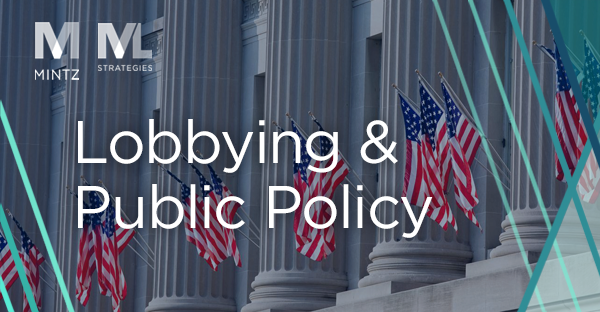
Public Finance
Viewpoints
Filter by:
New Legislation Would Expand the Use of Municipal Bonds
May 15, 2024 | Alert | By R. Neal Martin, Charles Samuels, Matthew O. Page, Christie Martin, Meghan Burke, Poonam Patidar
Read about the Local Infrastructure Financing Tools (LIFT) Act, pending legislation that calls for policy changes and types of bonds that could be used by governments and nonprofits nationwide for a range of public infrastructure and capital improvement projects.
IRA Update: IRS Releases Limited Guidance on Low-Income Community Adder and Establishes Allocation Program Needed to Make the Adder Available
February 16, 2023 | Alert | By Gregg M. Benson
Read about guidance released by the IRS on the Low-Income Community Adder and the newly established allocation program to make the adder available.
IRA Update: IRS Announces Updated Reference Standard for Energy Efficient Commercial Building Property Deduction Under Section 179D
December 28, 2022 | Alert | By Gregg M. Benson
Read about a new IRS reference standard for energy efficient commercial building property for purposes of the deduction under Section 179D of the Internal Revenue Code, which takes effect on January 1.
IRA Update: IRS Releases Reporting Requirements for EV Manufacturers and Sellers
December 22, 2022 | Alert | By Gregg M. Benson
Read about new IRS reporting requirements, issued in Revenue Procedure 2022-42, for manufacturers and sellers of new or previously owned clean vehicles or qualified new commercial clean vehicles eligible for tax credits under Internal Revenue Code Sections 30D, 25E, or 45W, respectively.
Public Comments Requested on Additional Aspects of the IRA Clean Energy Tax Incentives, including Clean Hydrogen Production, Carbon Capture and Sequestration, Clean Commercial Vehicles and EV Charging Stations
November 7, 2022 | Alert | By Gregg M. Benson, Xandy Walsh, David Salamon
On November 3, 2022, the U.S. Department of the Treasury (Treasury) and Internal Revenue Service (IRS) released three Notices requesting public comments by December 3, 2022, on certain additional aspects of the clean energy tax incentives included in the Inflation Reduction Act of 2022 (IRA). Treasury and the IRS previously released six Notices, on October 5, 2022, requesting public comments by November 4 on certain other aspects of the energy tax incentives, which are described in our alert. The Treasury and the IRS will consider written comments submitted after December 3 if such consideration will not delay the issuance of guidance.
Last Call: Public Comments on Inflation Reduction Act Clean Energy Tax Incentives Are Requested By November 4
November 3, 2022 | Alert | By Gregg M. Benson, Xandy Walsh
On October, 5, 2022, the U.S. Department of Treasury and Internal Revenue Service published six Notices requesting public comments by November 4, 2022 on certain of the clean energy tax incentives included in the Inflation Reduction Act of 2022. However, the IRS and Treasury will consider written comments received after November 4 that do not delay the relevant guidance. Input from industry stakeholders is important to help inform next steps for the IRS and Treasury and shape how these clean energy tax incentives are accessed in practice.
Treasury and IRS Release Final Tax Regulations for LIBOR Replacement Amendments
January 7, 2022 | Advisory | By Christie Martin, Matthew O. Page
SEC’s Proposed Broker-Dealer Exemption May Apply to “Finders” for Municipal Securities
October 13, 2020 | Blog | By Steve Ganis
Final Section 529A ABLE Plan Regulations Are Well-Intended But Will Require Further Clarification
October 12, 2020 | Blog
The Coronavirus Aid, Relief, and Economic Security Act: Assistance Available to Passenger Airlines and Airports
March 31, 2020 | Blog | By Tim McKeon, William Kannel
Congress Acts to Mitigate COVID-19 Impact
March 18, 2020 | Blog | By Anthony DeMaio, William Kannel
SOFR So Good! IRS Makes It Easier to Say ‘Goodbye’ to LIBOR
October 10, 2019 | Alert | By Christie Martin, Matthew O. Page
Risks of Imperfect Perfection, and How to Avoid Them
September 25, 2019 | Blog
First Circuit Rules That “Incorporation by Reference” of Collateral Description in UCC Financing Statements May Not Perfect Lien
February 14, 2019 | Blog | By William Kannel, Eric Blythe
IRS Releases Proposed Regulations Consolidating Guidance on Reissuance of Tax-Exempt Bonds
January 11, 2019 | Blog | By Christie Martin
Final Private Activity Bond Public Approval Regulations Streamline Notice Requirements
January 4, 2019 | Blog | By Christie Martin
IRS Expands Remedial Action for Nonqualified Use of Tax-Advantaged Bonds
April 13, 2018 | Blog | By Christie Martin
IRS Expands Remedial Action for Nonqualified Use of Tax-Advantaged Bonds
April 13, 2018 | Alert | By Christie Martin
Insolvent “On Behalf Of” Municipal Bond Issuers: Chapter 9, Chapter 11, or Ineligible?
February 26, 2018 | Blog | By William Kannel
Tax Reform: The Threat of Annihilation of Tax-Exempt Financing
November 9, 2017 | Blog | By Charles Samuels, Meghan Burke, John Regier
Explore Other Viewpoints:
- Data Centers & Digital Infrastructure
- AI: The Washington Report
- Antitrust and Federal Regulation
- Appellate
- Arbitration, Mediation & Alternate Dispute Resolution
- Artificial Intelligence
- Awards
- Bankruptcy & Restructuring
- California Land Use
- Cannabis
- Class Action
- Complex Commercial Litigation
- Construction
- Consumer Product Safety
- Corporate Governance (ESG)
- Cross-Border Asset Recovery
- DEI Legal Developments
- Debt Financing
- Direct Investing (M&A)
- Diversity
- EB-5 Financing
- Education & Nonprofits
- Employment
- EnforceMintz
- Environmental (ESG)
- Environmental Enforcement Defense
- Environmental Law
- Environmental, Social, and Corporate Governance (ESG)
- FDA Regulatory
- FDA in Flux
- False Claims Act
- Federal Circuit Appeals
- Financial Institution Litigation
- Government Law
- Growth Equity
- Health Care
- Health Care Compliance, Fraud and Abuse, & Regulatory Counseling
- Health Care Enforcement & Investigations
- Health Care Transactions
- Health Information Privacy & Security
- IP Due Diligence
- IPRs & Other Post Grant Proceedings
- Immigration
- Impacts of a New US Administration
- Insolvency & Creditor Rights Litigation
- Institutional Investor Class Action Recovery
- Insurance & Financial Services
- Insurance Consulting & Risk Management
- Insurance and Reinsurance Problem-Solving & Dispute Resolution
- Intellectual Property
- Investment Funds
- Israel
- Licensing & Technology Transactions
- Life Sciences
- Litigation & Investigations
- M&A Litigation
- ML Strategies
- Managed Care
- Medicare, Medicaid and Commercial Coverage & Reimbursement
- Mergers & Acquisitions
- Patent Litigation
- Patent Prosecution & Strategic Counseling
- Pharmacy Benefits and PBM Contracting
- Portfolio Companies
- Privacy & Cybersecurity
- Private Client
- Private Equity
- Pro Bono
- Probate & Fiduciary Litigation
- Products Liability & Complex Tort
- Projects & Infrastructure
- Public Finance
- Real Estate Litigation
- Real Estate Transactions
- Real Estate, Construction & Infrastructure
- Retail & Consumer Products
- Securities & Capital Markets
- Securities Litigation
- Social (ESG)
- Special Purpose Acquisition Company (SPACs)
- Sports & Entertainment
- State Attorneys General
- Strategic IP Monetization & Licensing
- Sustainable Energy & Infrastructure
- Tax
- Technology
- Technology, Communications & Media
- Technology, Communications & Media Litigation
- Trade Secrets
- Trademark & Copyright
- Trademark Litigation
- Unified Patent Court (UPC)
- Value-Based Care
- Venture Capital & Emerging Companies
- White Collar Defense & Government Investigations
- Women's Health and Technology





